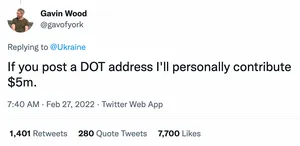Partway through the song, Zuckerberg sings "carpe the crypto diem". This raises the question of whether she intentionally included a dig at her brother Mark's failed Diem cryptocurrency project (formerly Libra), or if the project was such a flop even his own sister didn't know about it. I truly can't decide which scenario would be funnier.
Randi Zuckerberg tests your secondhand embarrassment tolerance with her second crypto-themed parody song
NFT collector files $6 million lawsuit against OpenSea, LooksRare, and the company behind Bored Apes for not doing more to discourage thefts
On February 1, he was the victim of a phishing attack in which he lost the three pricey NFTs. He had agreed to trade one of his Mutant Apes for another NFT he was interested in, but he and the prospective buyer had to perform the transaction through a platform other than OpenSea or LooksRare because it was a swap rather than a purchase for ETH. Armijo turned down several suggestions of platforms by the other party, saying he was unfamiliar with them, and instead suggested one of his own choosing. However, the other party was still able to send him a trading link that appeared to be from the site he had suggested, and Armijo approved what turned out to be an illegitimate transaction that allowed the other party to take all three of his NFTs for nothing in return. Armijo alleges that although he quickly realized he'd been phished, he was not able to get OpenSea or LooksRare to freeze sales of the stolen NFTs, and they were flipped for resale within days.
Armijo alleges that OpenSea and LooksRare have "utterly failed to protect consumers or do anything to disincentivize or stop the thefts" because they profit from each trade on their platform. He has also named the company behind the Apes NFTs, Yuga Labs, in his lawsuit, stating that they have not done enough to disincentivize theft by failing to "monitor its proprietary and exclusive ape community by denying entry to individuals whose access is predicated on a stolen BAYC NFT". Once again, my heart goes out to the judge hearing this case.
In terms of damages, Armijo states he has been "deprived not only of the significant monetary value of the NFTs he owned, but also [has been] strip[ped] of his membership in the BAYC community and the commercialization rights he possessed in his underlying Bored Ape and Mutant Ape images", and as such is seeking damages "in no event less than $6 million". Interestingly, the name Robert Armijo also appears as a defendant in SEC charges from June 2021, where the individual is alleged to have unlawfully sold securities managed by an organization also alleged by the SEC to be a Ponzi scheme. It's not immediately clear if this is the same person, or someone who shares a name.
- Armijo v. Ozone Networks, Inc. d/b/a Opensea, CourtListener
- "SEC Charges Additional Unregistered Brokers Who Sold EquiAlt Securities to Retail Investors", U.S. Securities and Exchange Commission
- "SEC sues La Mesa financial adviser over selling investments linked to a Ponzi scheme", The San Diego Union-Tribune
Elexir draws in more than $1.3 million, then announces an end to the project a week later and "reimburses" investors with $300,000
After their announcement went over about as poorly as you might expect, Elexir offered their community a choice: take the $300,000 they planned to airdrop, and either continue with that plan or re-add it to the liquidity pool. Community members by and large seemed to support an unlisted third mention, which was to refund the entire treasury to people who bought in, but the project developers seem intent on keeping that amount.
The project development team had had their identities verified by the organization StaySAFU, who subsequently tweeted that "We are currently communicating with both the team behind Elexir and the legal authorities", and that they had identity documents for the team members as well as video confirming they were responsible for rug pulls.
Cryptocurrency exchanges refuse requests by Ukrainian Vice President to freeze Russian and Belarusian addresses
Although perhaps unsurprising that these exchanges refused a request like Fedorov's, it will be interesting to see if and how sanctions may affect various cryptocurrency exchanges' actions. Binance, the largest crypto exchange, has already indicated it will comply with sanctions. Kraken, whose executives have tended towards more ideological stances, has also indicated that it will comply with legal requirements to freeze accounts.
Gavin Wood decides war in Ukraine is a great opportunity to promote his Polkadot project
Some with a more optimistic view of Wood's tweet suggested that perhaps his request was motivated by a desire to avoid capital gains taxes that could be incurred by converting his DOT to ETH before donating it, but another commenter pointed out that 1) Wood almost certainly holds more than $5M in ETH already as a co-founder of the project, and 2) Wood lives in Switzerland, where private individuals are generally exempt from capital gains taxes.
Co-founder and primary artist for Starcatchers NFT project uses insider knowledge to buy the project's rare NFTs to flip after reveal
It turned out that "Beutrec", a co-founder and the primary artist behind the collection, had used his access to the project metadata to identify and buy the rarest NFTs in the collection. Although he attempted to use distinct wallets to perform the transactions, they were trivially linked back to him. He made around 50 ETH (~$140,000) in profit from flipping the NFTs he bought with insider knowledge. After his actions were revealed in April 2022, Beutrec's new NFT project, Boki, announced that Beutrec would no longer be a part of their team.
Discord server for the Doodles NFT project is compromised
Howlerz NFT drop goes incredibly badly, with heavy botting, a poorly-implemented contract, and buyers falling for a scam contract
Part of this collection's draw has been the promise that "you own the art". However, the artwork is released under the CC0 license, which dedicates the work to the public domain — that is, any ownership of the work in a copyright sense no longer exists.
Crypto and NFT scammers take advantage of the invasion of Ukraine to boost their grifts
Ukraine-themed NFT projects have also sprung up all over the place, promising to donate portions of proceeds, with very few avenues to distinguish the legitimate from the scams. Some existing NFT projects have created Ukraine-themed items to add to their collections. Other NFT projects that have nothing to do with Ukraine have tried to tempt buyers by claiming they will donate a portion of proceeds (5%, in one case) to Ukrainian war relief funds. Individual sellers have also tried to use the crisis to increase the sales of NFTs they own, promising to donate their profits.
Needless to say, my advice if you're hoping to donate to relief would be to skip the cryptocurrency and NFTs altogether and pick any of the many verified relief funds out there.
Pixelmon raises $70 million only to reveal hilariously bad NFTs
Although the project lead wrote on the Discord that they had "made a horrible mistake" but that they would "completely revamp and redesign" the NFTs, the project appeared to be a cash grab. On the night of the reveal, 1,000 ETH ($2.8 million) had already been transferred out of the project and split among various addresses. One of the recipients who received 400 ETH ($1.1 million) immediately went on a shopping spree, buying various big-ticket NFTs with their windfall.









